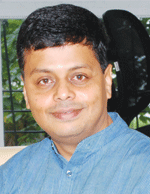Dilip Thakore interviewed Dr. Aromar Revi, director of the Indian Institute for Human Settlements and promoter of the proposed IIHS University in Bangalore. Excerpts:
 IIHS University is an ambitious and overdue initiative. what are its major objectives and expected outcomes?
IIHS University is an ambitious and overdue initiative. what are its major objectives and expected outcomes?
India is currently in the throes of a second wave of nation-building as it transforms from a primarily agrarian to urban society. This will require a transformation of our cities, towns and villages i.e human settlements, on a massive scale. Yet even when India’s urban population more than doubles to 800 million in about 2050, half the population may still be residing in rural India — something unique to South Asia. Hence keeping the balance between the urban and rural is central. A core objective of IIHS University will be to educate graduates, post-graduates and researchers with interdisciplinary problem-solving skills who can conceptualise, plan and manage quality human settlements in urban and rural India.
To what factors do you attribute the sorry condition of urban India?
An important cause of the sorry condition of our cities is that since the 1950s to the mid-2000s there has been a strong investment bias towards rural development to address India’s deep challenge of rural poverty. But this starved most cities, especially the small and medium towns, of development finance and institutional capacity. Of late there’s growing awareness that more than two-thirds of the country’s GDP is generated in urban India and this will grow. Hence, if we let our cities collapse, we’re inviting our economy to do so too.
To get the privately funded IIHS University going, you intend to raise Rs.400 crore. what has been the public response to this initiative?
The response to the institute and the idea of establishing an IIHS University has been overwhelming. We don’t expect to experience much difficulty in raising this amount from donors and partners in India and abroad over the next few years. It’s important also to note that this is only to establish our first campus. IIHS has been concept-ualised as a multi-campus university that enables inclusion by reaching out across the country.
To what extent, if any, has this private higher education initiative received the endorsement of the central and/or state governments?
IIHS University has been concept-ualised as an independent national university, with a diverse funding base, strongly inclusive character and a commitment to very high levels of excellence, in the tradition for example, of the Indian Institute of Science. We have been in discussion with the Union ministry of human resource development on regulation within the national Universities for Innovation frame. The government of Karnataka has been very supportive in helping us establish our first campus in Bangalore and we have already started working with public institutions to train officials and professionals. The idea of establishing an independent university is to ensure that IIHS University will be a truly autonomous institution which will be a safe environment for innovative thinking and practice.
Urban planning and practice is a relatively new science, particularly in India. how confident are you about attracting the high quality faculty required to attain the ambitious objectives of IIHS University?
This is our most difficult challenge. At full strength the IIHS University will have over 100 interdisciplinary faculty members drawn from India and abroad, with strong practice credentials. They will be supple-mented by adjunct and visiting faculty. We already have a sizeable number of domestic and international academics and practitioners who have been engaged in co-creating our Master of urban practice curriculum, that forms the core of this process and new faculty applicants are connecting with us every week.
Assuming that IIHS University gets off to a smooth start, how optimistic are you that India’s cities can be saved?
The human settlement challenges confronting India over the next few decades are unprecedented in a democratic society. Responding to them will require completely new approaches, analyses and a new system of humanistic, interdiscipli-nary and integrated education for all citizens, especially the professionals upon whose shoulders the respon-sibility of design, planning and management will devolve. The mission of IIHS University is to stimulate academic innovation supplemented by practice to transform our settlements and cities in particular and thereby deepen democracy, transform the economy and society in an equitable and sustainable manner.